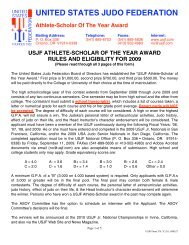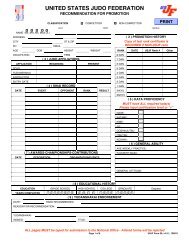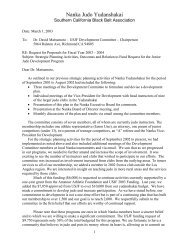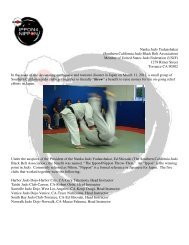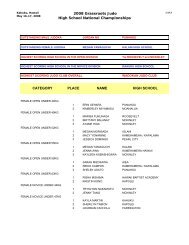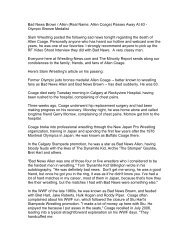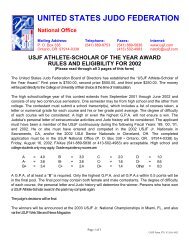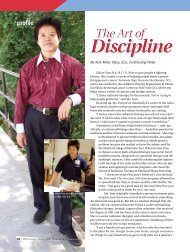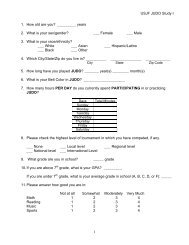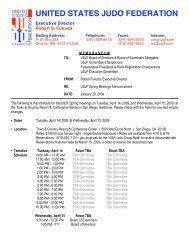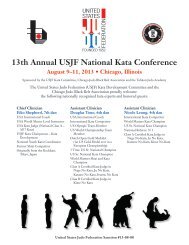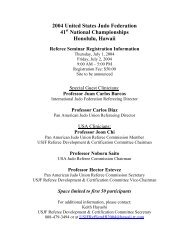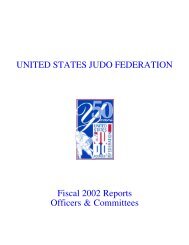2009 Judo Refereeing Rules - College Park Judo Club
2009 Judo Refereeing Rules - College Park Judo Club
2009 Judo Refereeing Rules - College Park Judo Club
Create successful ePaper yourself
Turn your PDF publications into a flip-book with our unique Google optimized e-Paper software.
ARTICLE 20 - IpponThe Referee shall announce Ippon when in his opinion the applied technique corresponds to the following criteria:(a) When a contestant throws (starting from the standing position) or counters the other contestant with control,largely on his back with considerable force and speed. (four elements)(b) When a contestant holds with Osaekomi-waza the other contestant, who is unable to get away for 25 seconds afterthe announcement of Osaekomi.(c) When a contestant gives up by tapping twice or more with his hand or foot or says Maitta (I give up!) generally asa result of Osaekomi-waza, Shime-waza or Kansetsu-waza.(d) When a contestant is incapacitated by the effect of a Shime-waza or Kansetsu-waza.Equivalence: Should one contestant be penalized with Hansoku-make, the other contestant shall immediately bedeclared the winner.Simultaneous Ippons - See Article 19 (f) (4).APPENDIX Article 20 – IpponSimultaneous techniques: when both contestants fall to the Tatami after what appears to be simultaneous attacks, andthe Referee and Judges cannot decide which technique dominated there should be no score awarded.Should the Referee announce Ippon during Ne-waza in error and the contestants therefore separate, the Referee andJudges shall, if possible, and in accordance with the "majority of three" rule, replace the contestants into as close totheir original positions as possible and restart the contest, if so doing will rectify an injustice to one of thecontestants.If one of the contestants deliberately makes a "bridge" (head and one foot or both feet in contact with the tatami)after having been thrown - although he may have avoided the necessary criteria for Ippon, the Referee shallnonetheless award Ippon or any other score he considers the technique warrants, in order to discourage this action.Long landings (Continuity of Landing): Judgment on how a throw should score is based on the entire landing fromthe initial point of contact or impact to the final part of the body or back landing on the tatami when all controlledmovement ceases.The complete landing in nage-waza must be considered in total for scoring purposes, even if the action is slow,uneven (slight hesitation), or irregular (e.g. opposite side), so long as there is no clear break in the technique. Thelanding must be continuous.Using Kansetsu-waza in order to throw the opponent will not be considered for point scoring purposes.(d) NOTE: For Olympic Games, World Championships, Continental and IJF events, the rules shall be applied asstated. For National events, the organizers are authorized to make such provisions as are appropriate for the safety ofthe contestants at the level to which the tournament applies. For example, in lower grade competitions, the organizersmay authorize the Referees to award Ippon when the effect of a technique is sufficiently apparent, or for children'sevents, they may disallow Shime-waza and Kansetsu-waza altogether.18



